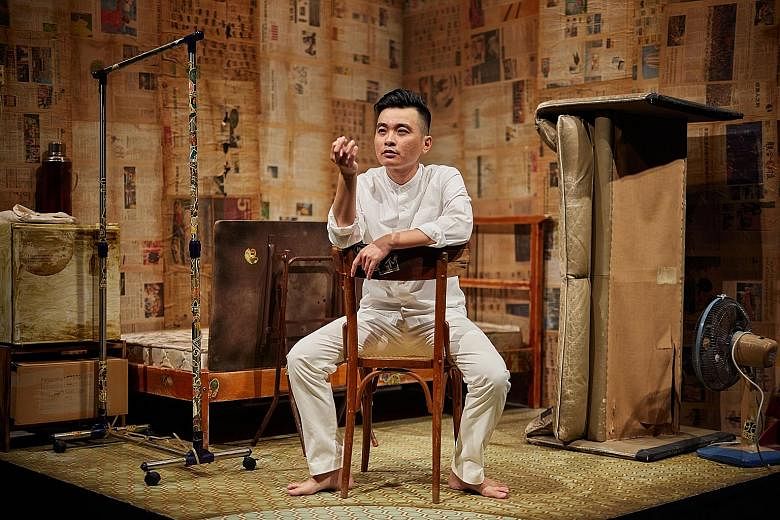THEATRE
CITIZEN X
The Finger Players
Huayi - Chinese Festival of Arts
Esplanade Theatre Studio, Monday
Citizen X is the concluding chapter to The Finger Players' Citizen trilogy. But it unfolds - for this reviewer, at least - as the companion piece to director Oliver Chong's Roots (2012).
Like the latter, this one-man show written by Liu Xiaoyi - first scuppered by the pandemic last March and given a second chance this year during Huayi - is a search for story, for beginnings and meaning.
The show's title is apt - X in mathematics is an unknown variable. Here, it ostensibly refers to Liu's grandfather, Liu Shou Tian, who came to Singapore in 1928.
As a storyteller, Liu, 38, instinctively grasps the dramatic potential of the parallels between his life and his grandfather's. Liu came to Singapore at the age of 16 as part of the second wave of Chinese migration southwards.
But, while Ah Gong chose to return to his home town of Jieyang after two years here, Liu has made a different life for himself in this little red dot.
The story begins with Liu and his friend Chong travelling to Jieyang in 2018 to interview family members for scraps of information about Ah Gong and his Singapore sojourn. But they find more gaps than details.
Family anecdotes emerge - that Ah Gong supposedly fled a persistent female pursuer in Singapore; and that he went hungry under communist detention because he was arrested so quickly, he had no chance to take his dentures with him. But Ah Gong remains an unresolved cipher, filtered through unreliable narratives.
This turns out to be a blessing in disguise. Ah Gong becomes the palimpsest upon which other chapters of Liu's family history are written - Liu's father, who is still bitter over losing access to education under the communist regime because he is classified as landowning class; and Liu himself, who wins a scholarship to Singapore and leaves his family and country for new pastures.
This is where Citizen X offers an insightful complementary bookend to Roots. Both map immigrant stories. But, while Chong's Roots hunts for a mythical return to a lost homeland, Liu's perspective details a difficult, and still unfolding, path towards a new home.
His family's story - peppered with tragic deaths and lifelong regrets, salted lightly with success - is modern China's trajectory writ small.
In this intimate excavation of his family's survival through a century of political and social upheaval, Liu offers Singaporeans a seldom seen entry point into the new Chinese migrant narrative.
-
Encore
-
In this weekly review feature, The Straits Times chronicles the recovery of Singapore's performing arts industry - whether through digital innovation or cautious reopening - after months in the dark due to the Covid-19 pandemic
What emerges are intriguing parallels between the Chinese and the Singaporean stories.
Liu's encounters with relatives who question his childless state and his choice of acting as a career will ring an immediate bell with young Singaporeans.
Both countries, and their peoples, have short memories which are only now slowly being confronted. The scene where Liu's father expresses his opinion that the Communist Party were interested only in money and were nothing more than hooligans is a vivid reminder of the human cost of the Party's rise to power.
Intriguingly, the scene also raises the question of whether Liu as an artist could have made this piece, had he not come to Singapore for his education and stayed to practise his craft.
Liu is a deft performer who can morph into a different character with a change in carriage in three short steps.
He keeps the pace moving and the audience engaged despite the challenges of massive chunks of Teochew dialect in the script.
Chong stages this piece with minimalist efficiency and maximum suggestion: The set of disassembled furniture which Liu "builds" into coherence; the karaoke interludes which combine entertainment with poetic resonance in the song curation; and the beef hotpot meal in the concluding scene that implies both homesickness and homecoming.
While Citizen X resists defining its central character, it succeeds in suggesting the multiple identities of migrants.


